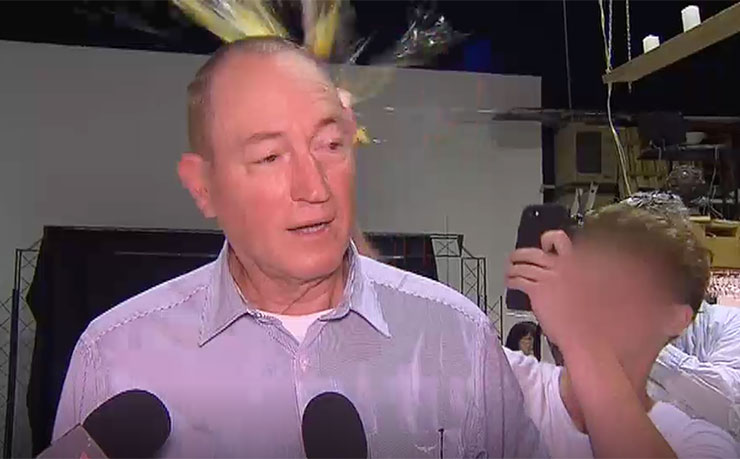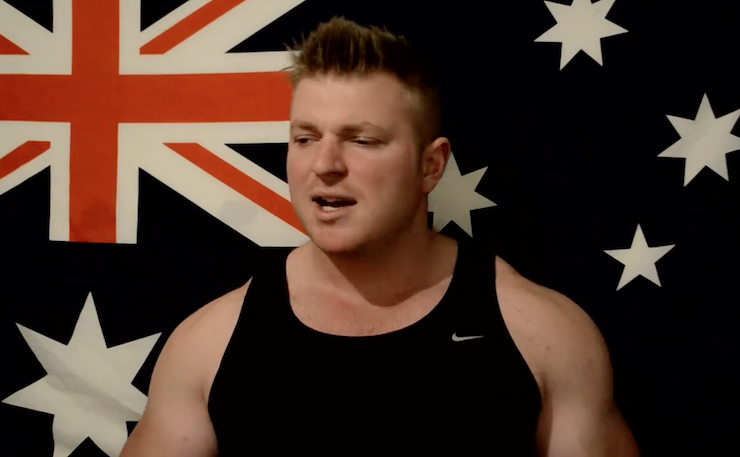DON’T MISS ANYTHING! ONE CLICK TO GET NEW MATILDA DELIVERED DIRECT TO YOUR INBOX, FREE!
The term ‘bogan’, used by ‘Egg Boy’ to describe a group of neo-Nazi’s who attacked him at a Melbourne rally recently, missed the mark, writes Chloe Koffman.
The tragedy of the recent Christchurch massacre has left both Australia and New Zealand grieving. In the aftermath of this heinous act and the revelation that the attacker was Australian, questions around anti-Muslim rhetoric and the far-right were brought to the forefront of public discussion.
That’s a good thing – our nation needs to confront its history of Islamophobia and race-baiting. But in doing so, we need to have an honest discussion around who is doing it, and why.
After Queensland Senator Fraser Anning released a media statement blaming Msulims for their own slaughter, he was ‘egged’ by a protestor, 17-year-old student Will Connolly (better as known as ‘Egg Boy’ across social media) during a far-right rally in Melbourne on March 16.
In a post-egging social media update on Twitter, Connolly referred to Anning’s supporters as “bogans” in a lighthearted video message.
“Don’t egg politicians, you get tackled by 30 bogans at the same time. I learnt the hard way”.
It’s not just Connolly who has used the term ‘bogan’ to refer to the attackers. Many users across social media echoed Connolly’s sentiment and used the Australian slang word.
‘Bogan’ specifically refers to a person of lower social class, specifically in relation to their dress, lexicon and behavior, which is deemed to be unsophisticated.
Though ‘Egg boy’ seems in good spirits and unaffected by the violent incident, his labelling of Anning’s supporters as “bogans” sparks questions about how Australia considers those who hold extreme views. In the midst of such a terrible event, it is easy and understandable to ignore the portrayal of the far-right supporters but it is important to Australia’s resistance to white supremacy that the two are not conflated.

Labelling Fraser Anning’s far-right cronies as “bogans” is problematic for two reasons. It first implies that Islamophobia is a problem of the working-class and not of the elite, when in fact, the movement is spearheaded by the political elite. Politicians like Pauline Hansen and Mark Latham fuel anti-Muslim rhetoric and Fraser Anning openly endorses neo-Nazis, speaking at and attending their rallies and citing Nazi terminology in Parliament.
Secondly, the “bogan” label detracts from the vile and dangerous nature of their beliefs and actions. Through their support of Anning, the far-right are openly advocating for an official White Australia policy, calling for the removal of immigrants and Muslims from our society. Other far-right rallies attended by Fraser Anning and his supporters include events run by the United Patriots Front where he has been pictured rubbing shoulders with neo-Nazi and criminal Blair Cottrell.
The support for these views cannot be seen as anything other than completely alien to the values of equality and democracy. However, by simply referring to the proponents of these views as “bogans”, it immediately categorizes them as your average country conservative rather than a danger to society.
The labelling of the far-right as ‘bogans’ reflects a wider problem; Australia’s tendency to casualise cultural issues.
Our country’s laid-back approach to cultural discourse and conflicting ideologies allows for the smoothing over of any accountability for those exploiting racial divisions. Dismissing Anning’s supporters as “bogans” creates a leniency towards these types of views instead of confronting the fact that white supremacy is not only alive and well in Australia but is thriving institutionally, as reflected in Scott Morrison’s disastrous interview with Waleed Aly in the wake of the Christchurch attack.
It is not just recent events that display this blasé approach to far-right agitators. You only need to look as far as the infamously racist Pauline Hanson competing on Dancing with the Stars in 2004, or Bob Katter’s erratic vitriol being turned into a popular meme to see that Australia doesn’t take these extreme and dangerous attitudes seriously.
The problem clearly extends beyond calling the far-right “bogans” and is a small part of a cultural practice that allows such extreme ideas to flourish.
Though Will Connolly should be applauded for his actions, his choice of words reflects, perhaps unintentionally, the fact that Australia needs to call out these abhorrent attitudes for what they are. We need to stop pretending that it is simply a problem of “bogans” and start acknowledging that the Australian cultural discourse is steeped in Islamophobia and racism.
A refusal to delegitimise the far-right is one of the first steps towards challenging the reproduction of colonial and white supremacist structures in this country.
Donate To New Matilda
New Matilda is a small, independent media outlet. We survive through reader contributions, and never losing a lawsuit. If you got something from this article, giving something back helps us to continue speaking truth to power. Every little bit counts.




